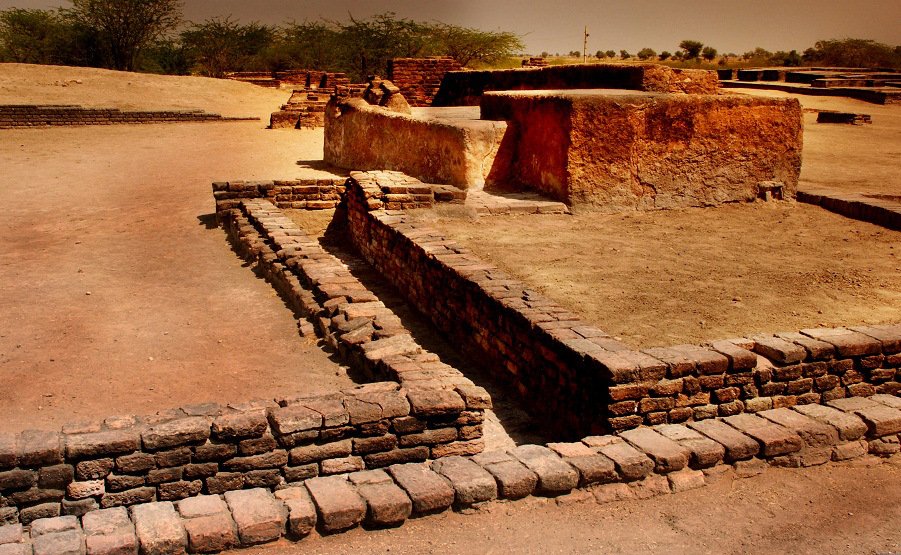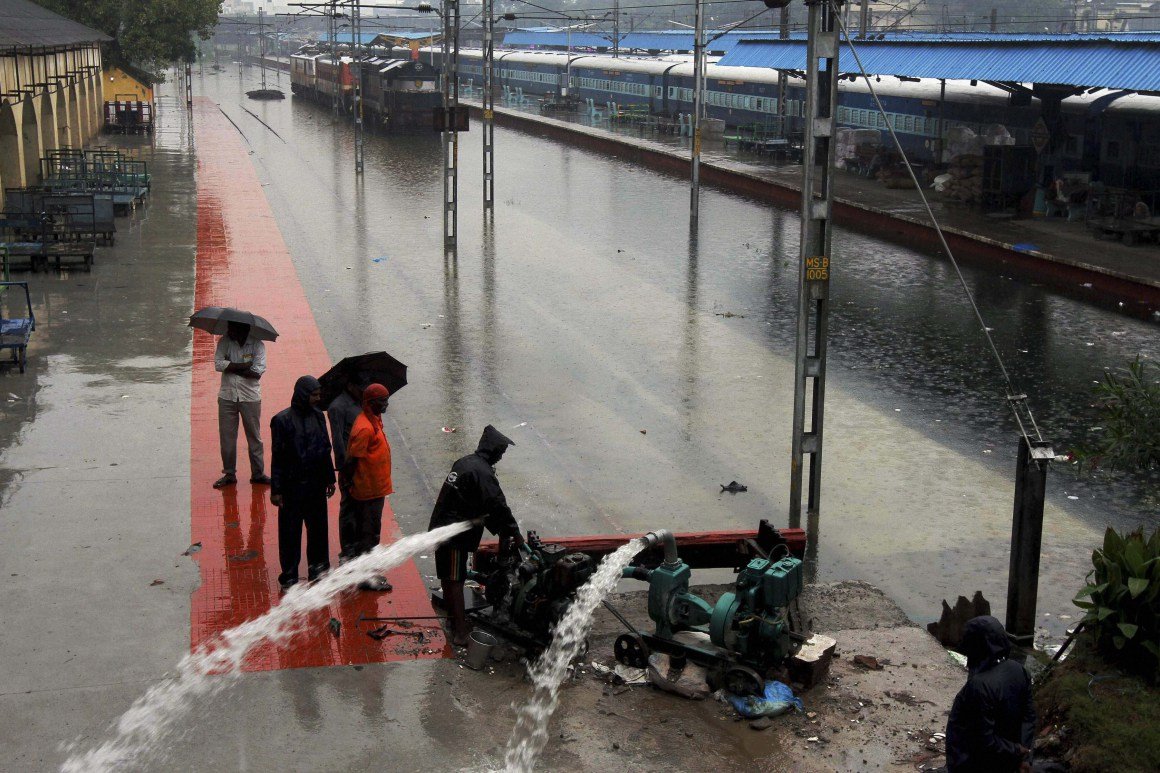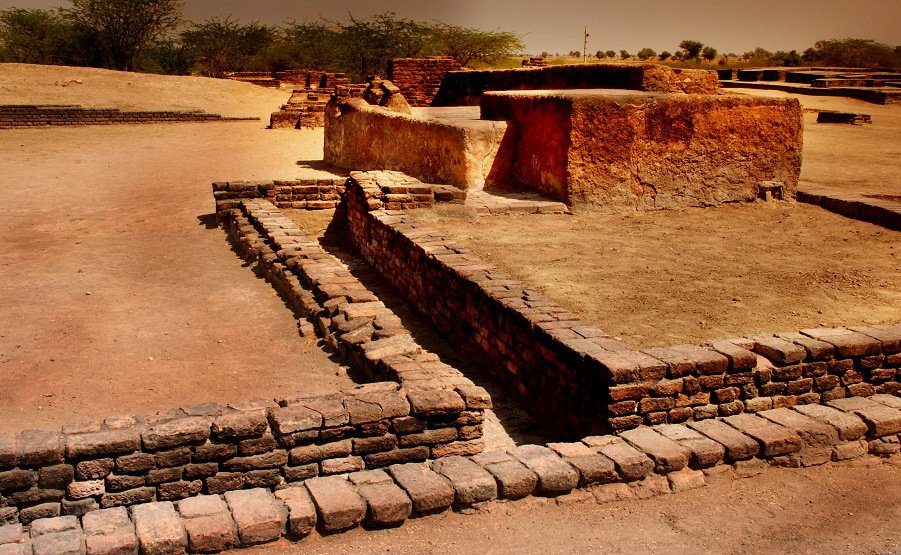
How Urban Greed Washed Away The Accumulated Wisdom Of India’s Past
2 Dec 2015 2:04 PM GMT
Source & Image: thewire | Author:
Anyone who has studied history knows that the people of the Indus Valley civilisation built cities and towns with excellent drainage and sewage systems. Five thousand years later, have we in India moved forward or backward?
Drains at Lothal, one of the centres of the Indus Valley civilisation. Credit: sewerhistory.org
The recent rains in Tamil Nadu have caused havoc on the streets of Chennai and elsewhere. Twitter and Facebook are full of photographs and videos of the flooding, even if the TV channels and newspapers have tended to ignore the story.
Vehicular traffic has been severely affected, power supply disrupted at many places, trains have been cancelled, rescheduled or diverted, and the life of the citizen – ordinary and “VIP” – thrown out of gear. Even the Chief Minister’s car is reported to have been stranded.
The misery which has unfolded is, of course, not unique to Tamil Nadu. All across India – from Srinagar to Chennai and Mumbai to Dibrugarh – rain is inevitably followed by water-logging on the streets of cities, causing immense suffering to the people. In September 2014, heavy rains turned the capital of Jammu and Kashmir into a lake, with many localities submerged under 20-30 feet of water. In my home town of Allahabad, many localities like Allahpur and Mumfordganj go under several feet of water every year after heavy rains. Kolkata’s waterlogged streets are well known, and parts of Delhi, e.g. Minto Bridge, have severe waterlogging in the monsoons. What is the cause of this?
The reason is simple to understand. Urban greed has destroyed our drainage systems.
Rains come every year in the monsoon or rainy season, and so there has to be a proper drainage system to take away the water, otherwise it will accumulate and cause waterlogging. Historically, indeed, all the way up to British rule and for some time thereafter, there were drainage systems in every city in India which were properly maintained by the municipalities.
-
 Chennai: Indian Railway workers pumping out the rainwater from tracks at inundated Vyasarpadi railway station after heavy rains in Chennai on Friday. PTI Photo (PTI11_13_2015_000280B)
Chennai: Indian Railway workers pumping out the rainwater from tracks at inundated Vyasarpadi railway station after heavy rains in Chennai on Friday. PTI Photo (PTI11_13_2015_000280B)
Gradually, however, people, in their greed, illegally built houses, shops, and other buildings on them, obviously in collusion with municipality officials, thus blocking the drains everywhere. In Srinagar, people illegally filled up both banks of the Jhelum river with earth, and built houses and other buildings on them, thus narrowing the width of the river. Obviously it will overflow in the rains.
Why did the authorities allow this to happen? Obviously money must have changed hands. To make matters worse, successive governments at the Centre and in the states have not bothered to invest in urban infrastructure – especially drains, pipelines and sewerage systems – despite the growing population of our towns and cities.
Srinagar’s celebrated Dal Lake has shrunk by 10 square kilometres since 1953. The lake covered 25 square kilometre in 1953 but is only 15 sq km today. Massive encroachments, the erection of many structures, house boats and hotels have contributed to this reduction in the size of the lake. The depth of the lake has also been drastically reduced. Obviously when there are heavy rains, the lake will overflow its banks.
What is the remedy for this malady?
People wade through a waterlogged road following heavy rains at Vyasarpadi in Chennai on Friday. Credit: PTI
Several PILs have been filed in connection with the waterlogging problem in India in various High Courts (Delhi, 2012;Cuttack 2007; Patna, 2012; Delhi, 2013, etc) . To my knowledge the Supreme Court has not heard such petitions. In Bangladesh, however, the Supreme Court has weighed in on the problem.
In various decisions of the Supreme Court, it has been held that the right to life guaranteed by Article 21 of the Supreme Court means a life of dignity, and not just an animal life.
Thus, in Chameli Singh vs. State of U.P., the Supreme Court observed:
“In any organised society, the right to live as a human being is not ensured by meeting only the animal needs of men. Right to live implies the right to a decent environment, medical care, food and shelter.. These are the basic human rights known to any civilized society. The civil, political, social and cultural rights enshrined in the Universal Declaration of Human Rights, the Human Rights Convention and the Constitution of India cannot be excercised without these basic human rights. “
To my mind, a PIL should be filed immediately in the Madras High Court, and the court should appoint a committee consisting not only of officials but also some technical people and some responsible citizens of Chennai and other affected cities of Tamil Nadu, empowering the committee to take suitable action to deal with the flood and waterlogging situation on a war footing – as was done by my bench in S.K. Garg vs. State of U.P. regarding the water shortage situation in Allahabad – and identify a permanent solution to this annual problem.
– Markandey Katju is a former judge of the Supreme Court. He also served as Chief Justice of the Madras High Court.
 All section
All section
 Drains at Lothal, one of the centres of the Indus Valley civilisation. Credit: sewerhistory.org
Drains at Lothal, one of the centres of the Indus Valley civilisation. Credit: sewerhistory.org Chennai: Indian Railway workers pumping out the rainwater from tracks at inundated Vyasarpadi railway station after heavy rains in Chennai on Friday. PTI Photo (PTI11_13_2015_000280B)
Chennai: Indian Railway workers pumping out the rainwater from tracks at inundated Vyasarpadi railway station after heavy rains in Chennai on Friday. PTI Photo (PTI11_13_2015_000280B) People wade through a waterlogged road following heavy rains at Vyasarpadi in Chennai on Friday. Credit: PTI
People wade through a waterlogged road following heavy rains at Vyasarpadi in Chennai on Friday. Credit: PTI












